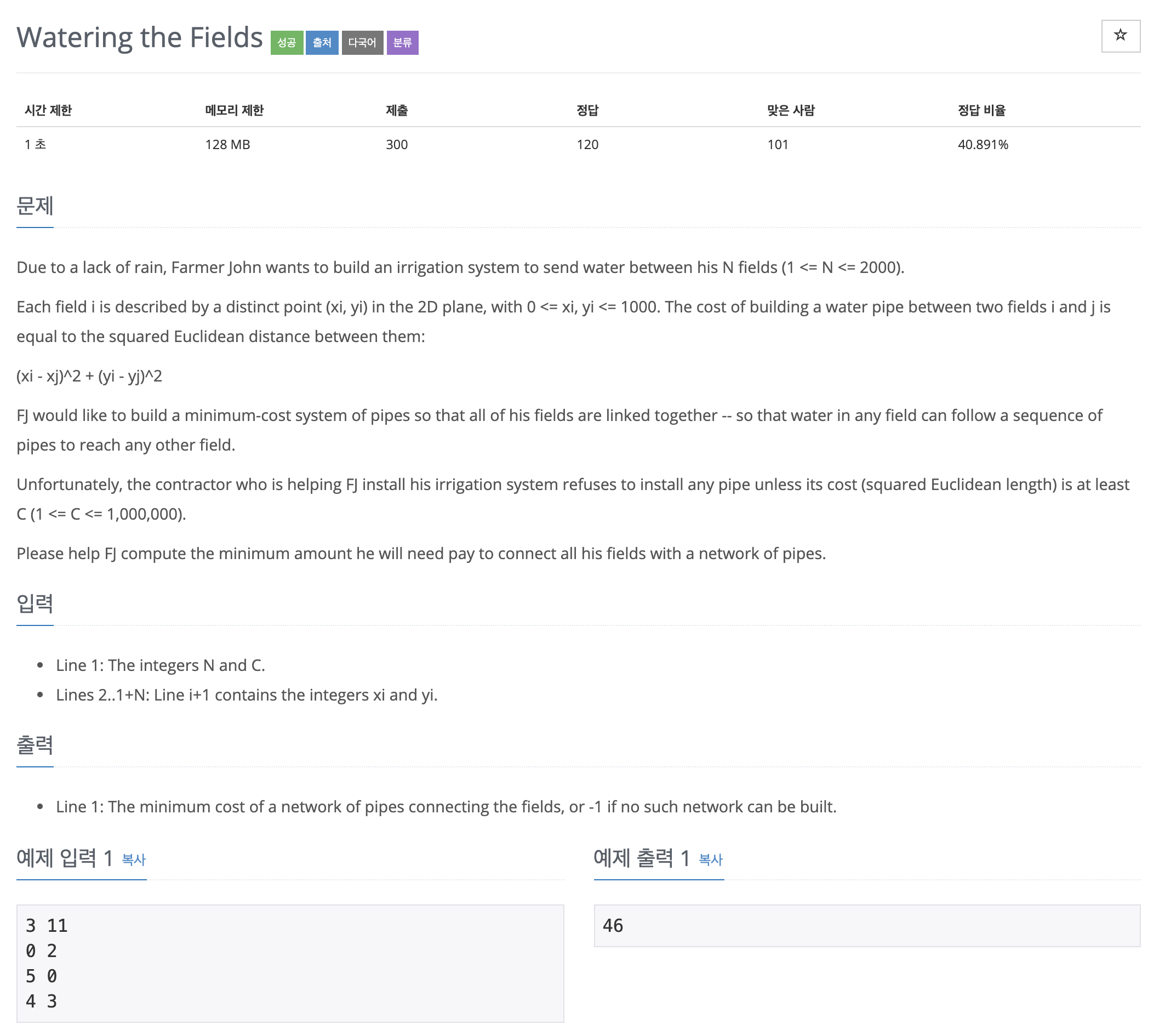10021번: Watering the Fields
Input Details There are 3 fields, at locations (0,2), (5,0), and (4,3). The contractor will only install pipes of cost at least 11. Output Details FJ cannot build a pipe between the fields at (4,3) and (5,0), since its cost would be only 10. He therefore b
www.acmicpc.net

풀이
N개의 필드 간 수로 파이프를 설치하는데, 모든 필드가 연결되도록 하는 최소 비용을 구하는 문제.
즉, 모든 필드를 잇는 최소 신장 트리(MST)를 도출해 내는 문제다.
그래프 내의 모든 정점을 잇는 트리를 신장 트리(Spanning Tree)라고 하며
그 중 사용된 간선 들의 가중치의 합이 최소가 되게 하는 신장 트리를 최소 신장 트리라고 한다.
gmlwjd9405.github.io/2018/08/28/algorithm-mst.html
[알고리즘] 최소 신장 트리(MST, Minimum Spanning Tree)란 - Heee's Development Blog
Step by step goes a long way.
gmlwjd9405.github.io
최소 신장 트리를 구현하는 방법 중 Kruskal MST 알고리즘을 이용하여 다음과 같은 방식으로 구현하였다.
1. 우선순위큐를 생성하여 모든 정점 사이의 유클리드 거리를 기준 오름차순으로 담든다.
- 우선순위큐에 거리 값을 직접 담는 것이 아니라 Node라는 객체를 담는다.
- Node는 시작 정점(start), 도착 정점(end), 두 정점 간 유클리드 거리(value)를 갖는다.
2. 정렬된 큐에서 Node를 하나씩 꺼내 최소 신장 트리에 적용이 될 수 있는 간선인지 체크한다.
- 꺼낸 Node의 value가 문제에서 주어진 조건인 C보다 작다면 넘어가도록 한다.
- 해당 간선이 여태껏 선택한 트리에 추가되었을 때, 사이클이 생기지 않는 지 체크한다.
사이클이 생기는 지 체크하기 위해서 유니온파인드 방식을 이용하였다.
유니온파인드 알고리즘 특성 상, 부모가 같다면 사이클이 발생하는 것으로 간주할 수 있다.
[알고리즘] 유니온 파인드 (Union-Find)
유니온 파인드(Union-Find) ① 유니온 파인드란? ▷ 대표적 그래프 알고리즘으로 '합집합 찾기'라는 의미를 가지고 있습니다. ▷ 상호 배타적 집합(Disjoint-set)이라고도 합니다. ▷ 여러 노드가 존재
brenden.tistory.com
3. 적용이 될 수 있는 간선이라면 sum에 해당 Node의 value를 추가해주고, count++해준다.
- count 변수는 추가된 간선의 갯수를 나타낸다.
- 최소 신장 트리는 최소 N - 1개의 간선을 갖기 때문에 간선 갯수가 N-1이 된다면 탐색을 종료한다.
4. 최소 값을 출력한다.
- count가 N - 1이 아니라면 최소 신장 트리가 만들어지지 않는 케이스이다. 이 경우에는 -1을 출력한다.
- count가 N - 1이라면 최소 신장 트리가 만들어지는 케이스임을 의미하기 때문에 sum을 출력한다.
코드
import java.io.BufferedReader;
import java.io.IOException;
import java.io.InputStreamReader;
import java.util.PriorityQueue;
import java.util.StringTokenizer;
public class Main {
private static int N;
private static int C;
private static int[] x;
private static int[] y;
private static int[] parent;
public static void main(String[] args) throws IOException {
BufferedReader br = new BufferedReader(new InputStreamReader(System.in));
StringTokenizer st = new StringTokenizer(br.readLine());
N = Integer.parseInt(st.nextToken());
C = Integer.parseInt(st.nextToken());
x = new int[N];
y = new int[N];
parent = new int[N + 1];
for (int i = 1; i <= N; i++) {
parent[i] = i;
}
for (int i = 0; i < N; i++) {
st = new StringTokenizer(br.readLine());
x[i] = Integer.parseInt(st.nextToken());
y[i] = Integer.parseInt(st.nextToken());
}
PriorityQueue<Node> queue = new PriorityQueue<>((o1, o2) -> (int) (o1.value - o2.value));
for (int i = 0; i < N - 1; i++) {
for (int j = i + 1; j < N; j++) {
long dist = (x[i] - x[j]) * (x[i] - x[j]) + (y[i] - y[j]) * (y[i] - y[j]);
queue.offer(new Node(i, j, dist));
}
}
int sum = 0;
int count = 0;
while (!queue.isEmpty()) {
Node node = queue.poll();
if (node.value < C) {
continue;
}
int x = node.start;
int y = node.end;
if (!isSameParent(x, y)) {
sum += node.value;
union(x, y);
count++;
}
if (count == N - 1) {
break;
}
}
if (count != N - 1) {
System.out.println(-1);
return;
}
System.out.println(sum);
}
private static int find(int x) {
if (x == parent[x]) {
return x;
}
return find(parent[x]);
}
private static void union(int x, int y) {
x = find(x);
y = find(y);
if (x != y) {
parent[y] = x;
}
}
private static boolean isSameParent(int x, int y) {
x = find(x);
y = find(y);
if (x == y) {
return true;
}
return false;
}
static class Node {
private int start;
private int end;
private long value;
public Node(int start, int end, long value) {
this.start = start;
this.end = end;
this.value = value;
}
}
}
'Tech > Problem Solving' 카테고리의 다른 글
| [백준 16639] 괄호 추가하기 3 (Java) (0) | 2020.11.08 |
|---|---|
| [백준 17780] 새로운 게임 (Java) (0) | 2020.11.05 |
| [백준 15591] MooTube (Silver) (Java) (0) | 2020.11.02 |
| [프로그래머스] 카카오 블라인드 리쿠르트 2020 - 블록 이동하기 (Java) (0) | 2020.09.02 |
| [프로그래머스] 카카오 윈터 인턴십 2019 - 징검 다리 건너기 (Java) (0) | 2020.09.01 |



